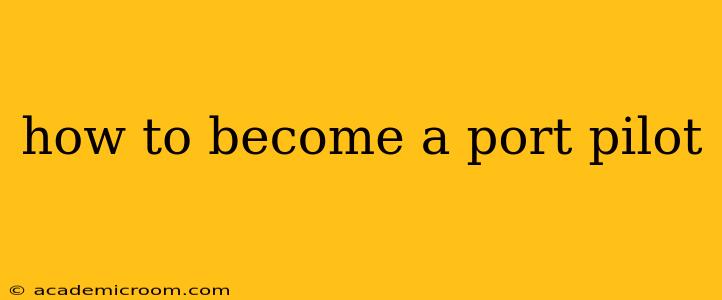How to Become a Port Pilot: A Comprehensive Guide
Becoming a port pilot is a challenging but rewarding career path, requiring a unique blend of exceptional seamanship, extensive nautical knowledge, and unwavering dedication to safety. This guide outlines the steps needed to achieve this prestigious profession. The process varies slightly depending on the country and port authority, but the core requirements remain consistent.
What Does a Port Pilot Do?
Before delving into the specifics, let's understand the role. Port pilots are highly skilled mariners responsible for the safe navigation of large vessels—from container ships and tankers to cruise liners—into and out of busy ports. They possess intimate knowledge of local waterways, including water depths, currents, tides, and potential hazards. Their expertise ensures efficient and safe vessel transit, minimizing risks to the environment and infrastructure.
What are the Educational and Experience Requirements to Become a Port Pilot?
This is often the most significant hurdle. The requirements are stringent and demanding:
- Extensive Seafaring Experience: Most jurisdictions mandate years of seafaring experience as a licensed officer, typically as a Master or Chief Mate, often accumulating thousands of sea days on various vessel types. This hands-on experience is crucial for developing the necessary skills and judgment. The specific number of years varies; some jurisdictions require 5 years, while others might require 10 or more.
- Formal Education: A strong academic background in maritime studies is typically required, often including a Bachelor's degree in Nautical Science, Marine Engineering, or a related field. Some jurisdictions may accept equivalent qualifications based on experience.
- Licensing: Holding a valid Master's license (often unlimited tonnage) is a prerequisite. This requires passing rigorous examinations demonstrating a comprehensive understanding of navigation, ship handling, and maritime regulations.
- Specific Port Authority Requirements: Each port authority sets its own specific requirements, which may include additional training, experience in specific vessel types, or local knowledge assessments.
How Long Does it Take to Become a Port Pilot?
The timeframe is highly variable, but it’s safe to say it’s a long-term commitment. It can easily take 10-20 years or more, encompassing the time required for formal education, sea time, and the rigorous pilot training and licensing processes.
What are the Physical and Mental Requirements of a Port Pilot?
This career demands peak physical and mental fitness:
- Excellent eyesight and hearing: Essential for safe navigation in often challenging conditions.
- Strong decision-making skills under pressure: Pilots face high-stakes situations and must make quick, informed decisions.
- Excellent communication skills: Effective communication with the vessel's captain, crew, and harbor officials is paramount.
- Physical fitness and stamina: Long hours on their feet, often in demanding weather conditions, are typical.
What Kind of Training is Involved in Becoming a Port Pilot?
Beyond the initial educational and experience requirements, prospective pilots undergo rigorous training programs specific to the port authority. This typically includes:
- Simulator Training: Extensive simulator training replicates real-world scenarios, honing navigation and ship-handling skills.
- On-the-Job Training: Experienced pilots mentor and train newcomers, providing practical experience under supervision.
- Local Knowledge Training: This is crucial, focusing on the specific characteristics of the port, including waterways, hazards, and operational procedures.
What is the Application Process Like?
The application process is intensely competitive. It usually involves:
- Submitting a comprehensive application: This includes documentation of qualifications, experience, and references.
- Written examinations: Assessing knowledge of navigation, maritime regulations, and local port procedures.
- Interviews: Evaluating suitability for the demanding role, including assessment of leadership, decision-making, and communication skills.
- Medical Examination: Ensuring the candidate meets the required physical and mental health standards.
What is the Salary and Job Outlook for Port Pilots?
Port pilot salaries are generally high, reflecting the responsibility and expertise required. The job outlook tends to be stable, although the number of positions is limited due to the highly specialized nature of the work.
Becoming a port pilot requires significant dedication, hard work, and a lifelong commitment to maritime safety. However, the rewards—both professional and financial—make it a highly desirable career for those who possess the necessary skills and ambition. Remember to check with individual port authorities for specific requirements, as regulations vary across different jurisdictions.
